 This summary shall focus on a Global Immuno-Talks webinar on Parasite Immunology by Maria Yazdanbakhsh, Head of the Department of Parasitology at Leiden University. She began her talk with a quote: “Parasites have done more for the immune system that the immune system for parasites”. This quote emphasises how much our current understanding of Th2 and regulatory T cell immunology is derived from studying parasite immunology.
This summary shall focus on a Global Immuno-Talks webinar on Parasite Immunology by Maria Yazdanbakhsh, Head of the Department of Parasitology at Leiden University. She began her talk with a quote: “Parasites have done more for the immune system that the immune system for parasites”. This quote emphasises how much our current understanding of Th2 and regulatory T cell immunology is derived from studying parasite immunology.
 Approximately 2 billion individuals, mostly from lower-middle-income countries, affected by some form of parasitic infection (Malaria, Schistosomiasis, Leishmania and many more). She began her talk highlighting studies that showed that T cells from people with parasitic infections were less responsive that T cells from uninfected but exposed individuals. This reduced responsiveness was rescued by anti-helminthic treatment, thus illustrating that parasites skew immune responses (to a Th2 dominant activity) and dampen immune responses. She then discussed a potential association between helminth exposure and allergies. Interestingly elevated levels of Th2-associated immune responses in helminth exposed individuals was associated with lower allergy prevalence (determined using allergy skin prick tests). Thus, suggesting that helminth-induced Th2 immunity prevents the development of allergy.
Approximately 2 billion individuals, mostly from lower-middle-income countries, affected by some form of parasitic infection (Malaria, Schistosomiasis, Leishmania and many more). She began her talk highlighting studies that showed that T cells from people with parasitic infections were less responsive that T cells from uninfected but exposed individuals. This reduced responsiveness was rescued by anti-helminthic treatment, thus illustrating that parasites skew immune responses (to a Th2 dominant activity) and dampen immune responses. She then discussed a potential association between helminth exposure and allergies. Interestingly elevated levels of Th2-associated immune responses in helminth exposed individuals was associated with lower allergy prevalence (determined using allergy skin prick tests). Thus, suggesting that helminth-induced Th2 immunity prevents the development of allergy.
 She then highlighted a recent study by De Ruiter et al., 2020 that demonstrated differences in Th2 immune profile between children from two different geographical locations: Europe (helminth unexposed) & Indonesia (helminth infected individuals pre-and post-treatment). The study observed very distinct signatures between Europeans and Indonesians, such as the expansion of frequencies of T helper 2 cells, particularly CD161+ cells and ILC2s in helminth-infected Indonesians. Besides ILC2s and CD4+ T cells, CD8+ T cells and γδ T cells in Indonesians produced type 2 cytokines. Regulatory T cells were also expanded in Indonesians, but only those expressing CTLA-4, and some co-expressed CD38, HLA-DR, ICOS, or CD161. CD11c+ (Source: de Ruiter et al., 2020).
She then highlighted a recent study by De Ruiter et al., 2020 that demonstrated differences in Th2 immune profile between children from two different geographical locations: Europe (helminth unexposed) & Indonesia (helminth infected individuals pre-and post-treatment). The study observed very distinct signatures between Europeans and Indonesians, such as the expansion of frequencies of T helper 2 cells, particularly CD161+ cells and ILC2s in helminth-infected Indonesians. Besides ILC2s and CD4+ T cells, CD8+ T cells and γδ T cells in Indonesians produced type 2 cytokines. Regulatory T cells were also expanded in Indonesians, but only those expressing CTLA-4, and some co-expressed CD38, HLA-DR, ICOS, or CD161. CD11c+ (Source: de Ruiter et al., 2020).
 In addition to allergies, researchers have also demonstrated a potential relationship between helminth infections and obesity (insulin resistance). Obesity is associated with the skewing of immune responses in adipose tissue from Th2 to Th1 predominant phenotypes (see image). She presented data that demonstrated that individuals infected with parasites had a lower prevalence of insulin resistance than uninfected individuals. Using a murine model they showed that parasite products interfere with glucose metabolism favouring insulin sensitivity thus preventing the development of obesity.
In addition to allergies, researchers have also demonstrated a potential relationship between helminth infections and obesity (insulin resistance). Obesity is associated with the skewing of immune responses in adipose tissue from Th2 to Th1 predominant phenotypes (see image). She presented data that demonstrated that individuals infected with parasites had a lower prevalence of insulin resistance than uninfected individuals. Using a murine model they showed that parasite products interfere with glucose metabolism favouring insulin sensitivity thus preventing the development of obesity.
Parasitic infections are not always favourable, skewing of immune responses to Th2- and regulatory T cell profiles negatively impact vaccine-induced Th1 mediated immunity. This highlights the impact environmental factors such as exposure to parasites have on vaccine immunogenicity
 You have probably heard of controlled human malaria infection models. Did you know that researchers also developing controlled human hookworm infection models? Prof Yazdanbakhsh presented preliminary data that demonstrated that infection was successful and leads to changes in immune responses.
You have probably heard of controlled human malaria infection models. Did you know that researchers also developing controlled human hookworm infection models? Prof Yazdanbakhsh presented preliminary data that demonstrated that infection was successful and leads to changes in immune responses.
She ended her talk highlighting the importance of understanding how environmental factors and helminth infection results in favourable outcomes such as the lower prevalence of allergy and obesity but contributes to lower vaccine immunogenicity.
Summary by Cheleka AM Mpande










